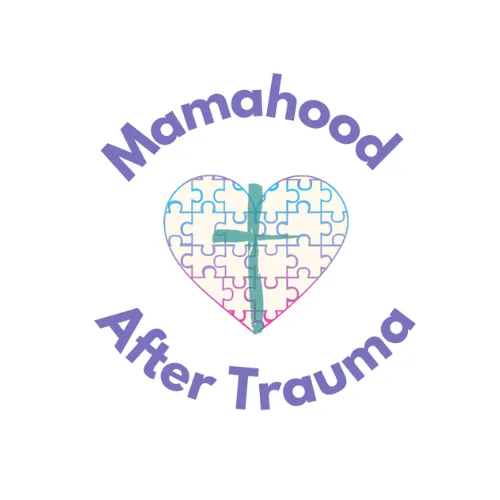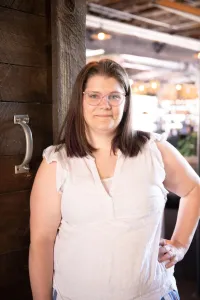
Discover a sanctuary for healing and growth in motherhood with the Mamahood After Trauma Podcast hosted by Emily Cleghorn. Dive into candid discussions and practical tips on parenting amidst trauma recovery.
Join Emily and her guests as they navigate the complexities of raising children while prioritizing personal healing. Find solace, strength, and joy in the beautiful chaos of mamahood after trauma.
Listen now!
Featured Posts

Reclaiming your Finances

This is a classic pandemic pivot for me. I was always, I would say good with personal finances. I found it fascinating so it was just something that I gravitated towards and it wasn't until I saw a lot of my peers really struggling with it, especially kind of getting to that 30-year milestone and that “Okay, I'll sign up for the workplace retirement…I'll do that when I'm older” I just really saw people around me struggling with it. So that really sparked an interest, not so much in the financial advisor, the wealth management side of it, but more the nuts and bolts, the things that we typically are not taught in school and often not taught by our parents and then in parenthood, all of those things just get exponentially harder.
It's so much harder when you have your priorities go from, you know, you have a few important things, you know, pre-kids, but once you have a kid, everything is so important. The stakes feel so high, it's really hard to figure out what to prioritize.
You know? I mean, there are so many late-night Amazon purchases. Hopefully, this will be the miracle thing to get the kid to sleep. So if you haven't got those nuts and bolts, that foundation is solid going into parenthood. This stage is just so hard, especially with, you know, all the added costs, the daycare costs, it, it's just really hard.
I feel like some of the advice that I've seen out there is a little a little flat. It kind of doesn't always resonate with just how hard this life stage is. There are so many factors that you need to take into consideration. So I love being able to work with parents kind of one-on-one and just help them navigate making decisions that feel right for them and their families- Their values, what works for them, you know, their personality, their strengths and weaknesses. They just build the future that they want, but also being able to enjoy the stage of life that they're in right now.
I think for so many with young kids, we get so focused on meeting the needs, the financial needs, and all of the expectations that are on us that we sometimes forget to be present in the moment with our kids, and we miss out on a lot of those developmental milestones because we're so busy with everything else.
What are three of the biggest stumbling blocks that you see with your clients?
So I am a huge advocate of tracking your spending in some capacity.
For some people that's, you know, writing it down every day, writing everything you spent, I think that's probably unrealistic for most people. But having some way to monitor where your money is going, doesn't necessarily need to be a lifelong thing. Although for me, I've been tracking it for over a decade and I love that data.
But just to be able to see where is your money going? Does that reflect, first of all, what you even realize? I think a lot of times it isn't until we see a list of where our money went that we realize, oh wow. I go to…whether it's Starbucks, Target, or whatever it is, I go there a lot. I didn't realize I was spending that much money.
And that's not to say like I, I'm, I'm really, um, you know, not coming at this from like a shameful perspective, but just kind of seeing what your behaviours are and does that fit what your priorities are right now? And then also seeing what you are not spending money on. Sometimes, you know, we have a lot of, again, with the mindless Amazon purchases, and then we say, I can't afford to insert something that feels like a little bit indulgent.
I see a lot of clients who would love to hire like a house cleaner and feel like that's like, that's unrealistic. People like me don't pay for that. That feels frivolous. I could do it myself. And yet they spend more than that. Impulse purchases, you know? At Target or Amazon or something like that.
And so just getting clear on where your money is going, does that fit, you know, what you want in your life? so I think that's a huge thing, I think. I think figuring out what your values are, which I know is kind of a, you know, sometimes it feels like an awkward exercise, but just getting clear, you as an individual, as a family, what is most important to you?
So when, when I started tracking my income, I had to shift my mindset and remember that it's not so much that we are in scarcity or lack, or not enough but we are being mindful of where we're spending our money. So that's, that's a that's a mindset thing that I have had to work towards and I think that is in part because of my experiences growing up in, with trauma and all of that stuff in my background, because your trauma does not just affect one area of your life. It, it's like a sticky spider– it goes everywhere.
Going back to the idea of not being shameful– we're going to indulge in some treats from time to time. We're not always going to make perfect ideal decisions in every situation, but seeing which indulgences, which splurges are adding a lot of value to your life and which are just that brief dopamine hit and then we forget about it because of convenience.
What are some steps that you often have your clients do, to get a handle on their finances?
So, I mean, I talked earlier about tracking your spending. Yeah. I think that's kind of a baby step toward building a budget. When I say the word budget, I know it kind of irks some people. It is it kind of thought of as similar to the word diet. It is very restriction-focused, and I don't love that-- the way I approach budgeting is much more kind of like projecting what you're spending is gonna be and doing our best to try to hit it. If we don't, we look at why... Was there a specific reason? Could we have anticipated that? What did we learn from not hitting the budget last month to be better? Um, you know, planning next month. Is that the, one that we tried, I see a lot of people trying to be super restrictive, like month one in a budget and that never works.
We need to take baby steps. We get 10% better, 10% better over time, rather than, I'm just not going to spend on XYZ this month and that just doesn't work.
Taking kind of small steps to see where you're spending and where you want to be spending.
How depressing it can be to just be like muddling through. I think a lot of times when things feel hard, they feel tight. We tend to rely on coping mechanisms, like the impulse buys-- the daily Starbucks, or coffee in general gets picked on a lot. So I don't mean to, you know, dump on that, but, we kind of rely on these little treats to keep us going, but if we have a goal that we're working towards, it's a lot easier to say no at that moment.
Where can people connect with you if they wanna connect with you further?
My website is sarahroller.com

Don't miss an episode again!
Subscribe to get updates sent to your inbox!
© Copyright Emily Cleghorn 2024


